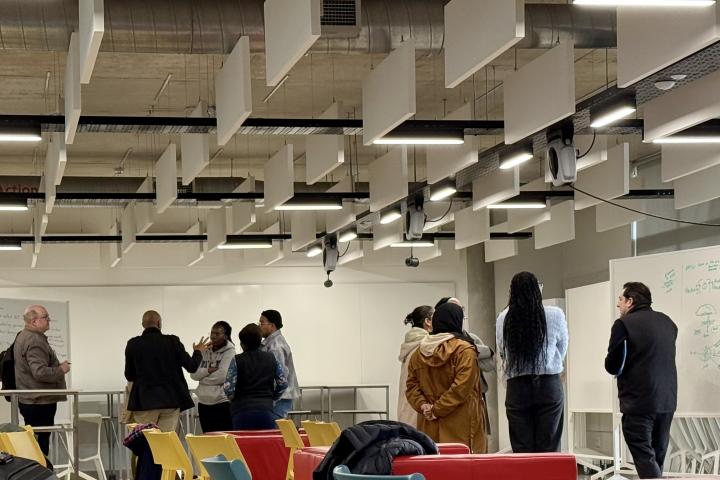Navigating Ethics in the Age of AI

Participants engaging in a discussion at the workshop. Photo: Kende Kefale.
On Friday 6 June 2025, the Data Analytics for Student Success (DASS) team hosted a data ethics workshop at the d-school, bringing together diverse stakeholders from across the institution, including the DVC for Teaching and Learning, Professor Brandon Collier-Reed, academic and professional staff members from Faculties, the Libraries, Careers Service, Disability Service, Properties and Services, as well as postgraduate students.
The workshop addressed the ethical use of student data in operations, decision-making and research functions within our institution. It started with opening remarks by Mr Stephen Marquard, Deputy Director at the Centre for Innovation in Learning and Teaching (CILT) and Dr Riashna Sithaldeen, Deputy Director in the Institutional Planning Department (IPD). The programme for the day showcased the DASS Data Ethics Framework for Student Data with its implementation guidelines and resources. The morning session focused on the ethical challenges that UCT colleagues face in using student data in their work contexts, while the afternoon session looked at the ethics of using AI in the work that we do.
Speakers of the day
Dr Kende Kefale, data analyst in the IPD, presented his observations of ServiceNow Data Requests and offered helpful guidelines for submitting requests for student data such as enrolments, completions, conversions and associations. He also shared a few examples of past requests and the interesting visualisations that were produced as a result.
Dr Robert McLaughlin, DASS consultant, introduced colleagues to the DASS Data Ethics Framework for Student Data, a draft document created through a series of engagements and workshops with diverse stakeholders across UCT. He shared the composition of the framework and the important factors to consider regarding access, use and implementation of the framework.
Participants also engaged in small group discussions to reflect on the ethical questions about using data that challenge their work. This session, facilitated by Dr Greig Krull, from CILT, provided a platform for meaningful engagement and important questions were asked such as: How do we ensure the integrity of those who have access to student data? How can we safeguard against bias in our data interpretation? What are the rules for ethical data sharing?
Ethics in the Age of AI
The workshop ended with two very thoughtful presentations on ethics in the age of AI. Firstly, Dr Robert McLaughlin provoked discussion about what is considered original thought in the age of AI and raised the question How do we define originality? This was followed by A/Prof Daniela Gachago (CILT) who laid out the benefits, limitations and ethical uses of Generative AI in research.
The workshop underscored the necessity for the institution to proactively support staff and students in navigating the evolving ethical landscape. The DASS team's initiative in hosting this workshop signals a vital step towards fostering a culture of responsible data stewardship and navigating the complexities of AI integration within the institution's operations, decision-making, and research functions.
Resources:
- McLaughlin, R. 2025. Implementing the Data Ethics Framework for Student Data.
- McLaughlin, R. 2025. Original Thought In the Age of Artificial Intelligence.
- Gachago, D. & Luescher T. 2025. AI for Research and Writing.
